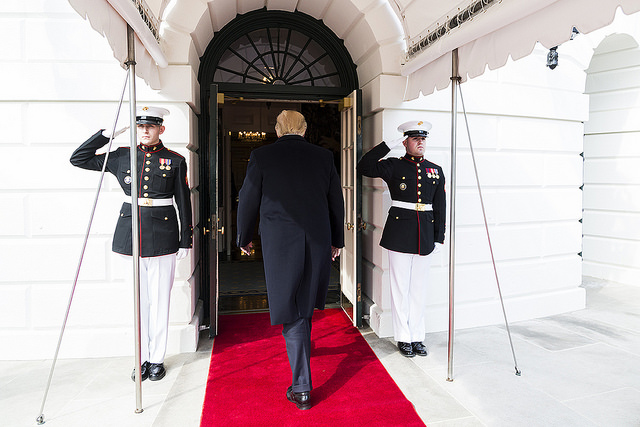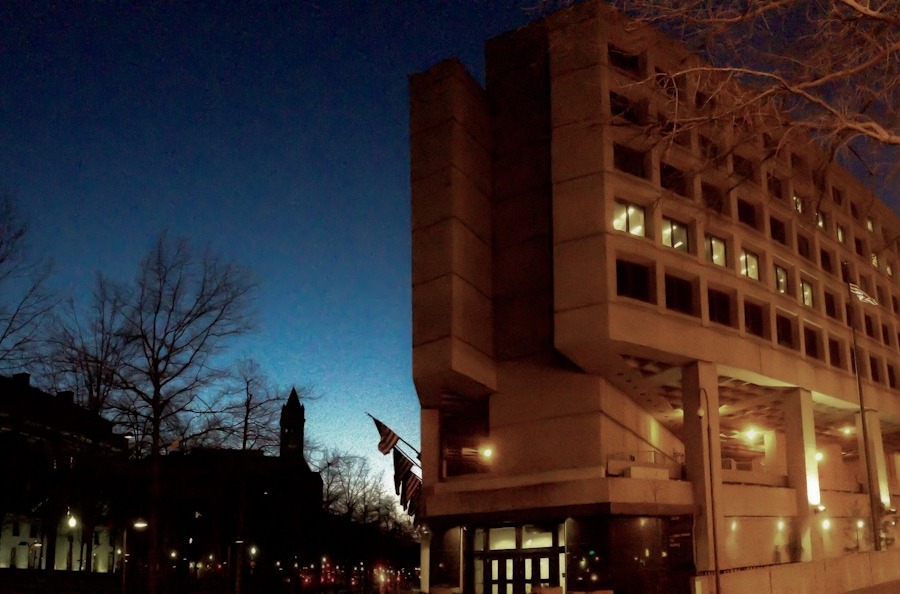The Rob Porter Case: Scandal in the Demagogic Presidency
A presidential scandal of any importance captures something essential about the administration in question and the politics of the time. In Watergate, a president overcome by his paranoia and resentments broke laws to undermine impassioned opposition to his war policies and his reelection. Iran-Contra featured Cold War intrigue and machinations in a weakly managed White House whose leader struggled with the details and legal implications.

Published by The Lawfare Institute
in Cooperation With

A presidential scandal of any importance captures something essential about the administration in question and the politics of the time. In Watergate, a president overcome by his paranoia and resentments broke laws to undermine impassioned opposition to his war policies and his reelection. Iran-Contra featured Cold War intrigue and machinations in a weakly managed White House whose leader struggled with the details and legal implications. Bill Clinton’s troubles in 1998 began with personal behavior and exposed deep partisan division over the relevance of this conduct to his viability as a president—and the use and abuse of law and impeachment to settle the question.
Of course, the unfolding and course of scandal is never straightforward. The press can succumb to investigative fever and overheat its coverage. The political opposition is always ready to make the most of its competitive opportunities. Policy and political differences may come to be “legalized” as prosecutors and lawyers take control of the definition of the issue. But true presidential scandals, both the lesser and the greater ones, are portraits of a presidency that bring out telling details about their subjects.
Whether it comes to be judged a greater or lesser scandal, the debacle of Rob Porter—the White House staff secretary kept on at his post despite numerous allegations of abuse by his ex-wives and at least one from a former girlfriend—conveys much of what we might expect from the presidency of Donald Trump. The old slogan, the “personal is political,” is inverted in this government: its political or governing challenges are inevitably subordinated to the president’s whims, urges, impulses, or self-interested calculations. The demands of sound public administration, legal limits, institutional norms and ethical constraints are under constant pressure from the Trump ego. The president cannot get away from himself—a defining characteristic of a demagogue.
But a demagogue in the Oval Office will be unlike other presidents in having both a propensity and a taste for scandal. Scandal is disruptive but also, for that reason, rich in opportunity for the demagogue: it helps fuel the perpetual combat on which he thrives. So the way Trump operates makes scandal more likely; and once it is upon him, he will typically relish it. It is useful to recall Donald Trump’s conduct in past eras, before his political career. In 1990 he collaborated enthusiastically in Marie Brenner’s 1990 Vanity Fair examination of his business failure and broken marriage, concluding the interview sequence with just two questions: How long was the article? And was it a cover?
All of the elements of Trump’s demagogic governing style are present in the production and handling of the Porter scandal.
Governance by Self-Gratification. Trump’s equation of his personal wishes with the general welfare is well enough established, and regularly (if inexactly) termed his “narcissism.” He is sure that he is entitled to have what he wants--and that he is absolutely right to want it. “I tend to be right,” he has told Time magazine, “I’m an instinctual person. I happen to be a person who knows how life works.” And he has asserted repeatedly that “nobody” has achieved or excelled more, and that as president, he may be second only to Abraham Lincoln.
The president seems to have liked Porter, and on the basis of what we have learned about the president’s behavior over the last year, it is reasonable to assume that this affinity for Porter was enough to keep this staff secretary at his sensitive post with a security clearance he should not have had. Porter should not have had a clearance for a number of reasons: 1) the White House should not employ individuals who have committed domestic violence; 2) Porter’s history put him at risk of blackmail; 3) this history of emotional instability compounded the risks of having Porter in this key position. But the president wanted him in the job.
Governing By His “Base.” In the quest for self-gratification, Trump is driven to build and stick to a message determined primarily by what the president believes that “my base” would want to hear. He deliberately did not express from the outset his concerns for the victims of Porter’s violent behavior. He took his good time to voice, even in principle, his opposition to domestic violence; he needed a few days for his defense of Porter, wrapped in an ostensible concern for “due process,” to sink in. All presidents naturally gauge the political impact of their actions. The best ones keep this assessment in balance with others factors. Trump does not do balance.
When Trump finally offered his “total” rejection of domestic violence, he said nothing about the victims of Porter’s abuse, these women in this particular case. He perfunctorily saluted the general proposition that hitting a spouse is objectionable, then added, gratuitously, that he should not even have had to say it. It was self-evident, after all. Of course, he had created by his previous silence the very reason why he did have to say it. But he wanted his audience to know he would stand against his howling media critics, refusing to give in a “mere” allegation and maybe even an “old” one. In no way would he be a party to railroading this fine young man out of town. As Trump has so often in the past, he was looking to rile his followers with visions of an older order, one purged of the political correctness he despises: “Is there no such thing any longer as Due Process?”
Governance by Controversy and Disorder. The episode also shows how Trump uses and stokes controversy and disorder to achieve other of his “governing” objectives. It may be surprising that a president would see opportunity in the prolonged public relations stresses of a scandal. In Trump’s case, there is good reason to believe that he has welcomed days of harsh appraisals of a chief of staff he would apparently like to be rid of. Or perhaps he merely wants to humble the John Kelly, to break him a little more to his will. Either way, the Trump administration is one in which the leader revels in the discord he routinely sows.
Brazenly false public accounting. The Trump White House could not settle on a tall tale that would hold up under scrutiny for longer than a press cycle. The most farcical of them all was the last—the claim that 13 months into the administration, after repeated FBI reports about Porter’s history, an administrative office in the White House had to review the findings and make what Sarah Huckabee Sanders termed a “recommendation for adjudication.” Anyone familiar with how clearances processes function could spot the lie as soon it was uttered.
But why the serial misrepresentations, when experience teaches that repeated lying cannot succeed in ending the story, only assuring that it will drag on? In the end, it all comes back to the president. Any White House in a bind might hope to spin itself out of trouble, putting the best possible face on its version of events. How well the administration fares with these moves depends on both artfulness and a baseline recognition that for spin to succeed, it has to bear some resemblance to the truth. Trump is not working from a factual baseline. He will insist on pushing out whatever narrative he would like the press corps and public to believe, regardless of that narrative’s relationship to the facts. This is his White House’s mode of operation in matters big and small, beginning with the post-inauguration “crowd size” fantasy that he expected Sean Spicer to peddle.
The falsehoods so routinely disseminated by the administration are not just the products of incompetence. They do much of the work of Trump’s presidency; they invite scandal and keep it going.
The role of Trump’s lawyers. Lawyers help set up protections against scandal; and if scandal comes to pass, they are members of the crisis management team. The White House counsel is usually in a leading role. Like any “client,” presidents manage scandals (or avoid them) by obtaining sound legal advice and following it. They might be suspicious of lawyers or uncomfortable with them, but they accept that the part that counsel must play. Trump sees government lawyers as he sees others—an instrument for the achievement of his ends. One senses that he would be happy to have Michael Cohen in the job of White House counsel.
Already in this young administration, Trump has called on White House Counsel Don McGahn to help with the firing of the FBI director and the special counsel, and he dispatched him to pressure the attorney general to disregard the Justice Department’s recusal rules. There are also reports that, frustrated with his lawyer’s failure to perform as directed, the president has also subjected McGahn to “outbursts” of rage and recrimination.
In the Porter scandal, McGahn was aware of the serious clearance long before it became public. It has been reported that at some point he counseled Porter to resign, but Porter declined. It is not clear how McGahn responded. It is fairly supposed that he either pressed his concerns and still made no headway, or he decided, for whatever reason, to let the clearance problem fester.
It is difficult to fully evaluate McGahn’s performance in this and other controversies without access to all the facts. A “person close to McGahn” assured the Washington Post that the White House counsel believes his client to be the institution of the presidency, not the person of Donald Trump. It would be important to know how this understanding of the counsel’s role shaped the substance and timing of the advice McGahn gave about Porter. We can be fairly certain that Donald Trump expected that he was the “client”, and the only client, entitled to this advice. The president is not one to clearly distinguish, if he sees the difference at all, between his person and the institution of the presidency.
All of these elements produced the Porter scandal, and all of them are active each day in the operation of this government. At any time, they can combine to ignite the next mess, as they surely will. And Trump will not always be bothered by the upheavals that scandals introduce into an administration or the governance of the country. The incessant controversy and upheaval seem to work for him, keeping him at the center of attention, reminding his base that he is battling their common enemies, and opening opportunities for him to reshuffle or fire personnel in the presidential reality show that drives his perceptions of his ratings. This is the nature and function of scandal in a demagogic presidency.


.jpeg?sfvrsn=6117c6bf_4)


